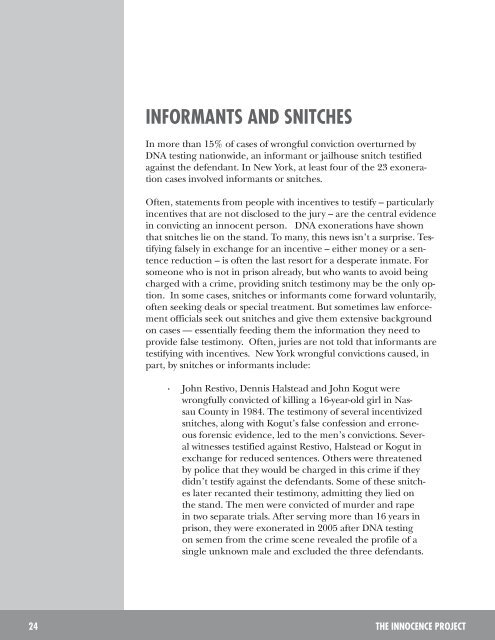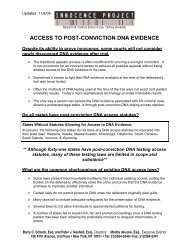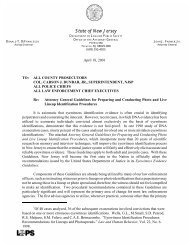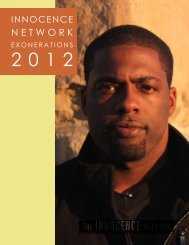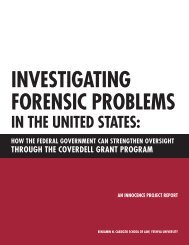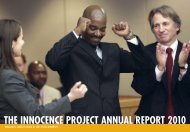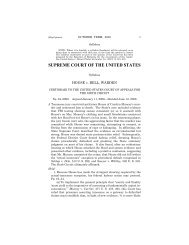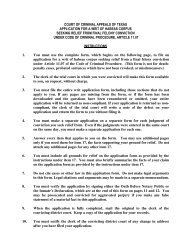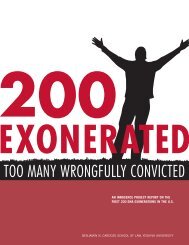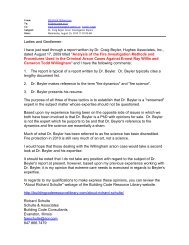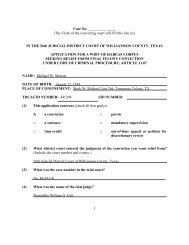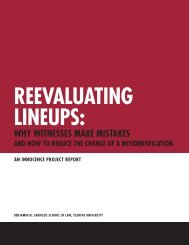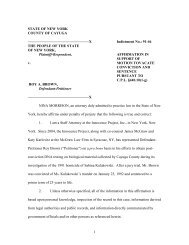Lessons Not Learned - The Innocence Project
Lessons Not Learned - The Innocence Project
Lessons Not Learned - The Innocence Project
Create successful ePaper yourself
Turn your PDF publications into a flip-book with our unique Google optimized e-Paper software.
InFoRMAnTs AnD snITCHes<br />
In more than 15% of cases of wrongful conviction overturned by<br />
DNA testing nationwide, an informant or jailhouse snitch testified<br />
against the defendant. In New York, at least four of the 23 exoneration<br />
cases involved informants or snitches.<br />
Often, statements from people with incentives to testify – particularly<br />
incentives that are not disclosed to the jury – are the central evidence<br />
in convicting an innocent person. DNA exonerations have shown<br />
that snitches lie on the stand. To many, this news isn’t a surprise. Testifying<br />
falsely in exchange for an incentive – either money or a sentence<br />
reduction – is often the last resort for a desperate inmate. For<br />
someone who is not in prison already, but who wants to avoid being<br />
charged with a crime, providing snitch testimony may be the only option.<br />
In some cases, snitches or informants come forward voluntarily,<br />
often seeking deals or special treatment. But sometimes law enforcement<br />
officials seek out snitches and give them extensive background<br />
on cases — essentially feeding them the information they need to<br />
provide false testimony. Often, juries are not told that informants are<br />
testifying with incentives. New York wrongful convictions caused, in<br />
part, by snitches or informants include:<br />
•<br />
John Restivo, Dennis Halstead and John Kogut were<br />
wrongfully convicted of killing a 16-year-old girl in Nassau<br />
County in 1984. <strong>The</strong> testimony of several incentivized<br />
snitches, along with Kogut’s false confession and erroneous<br />
forensic evidence, led to the men’s convictions. Several<br />
witnesses testified against Restivo, Halstead or Kogut in<br />
exchange for reduced sentences. Others were threatened<br />
by police that they would be charged in this crime if they<br />
didn’t testify against the defendants. Some of these snitches<br />
later recanted their testimony, admitting they lied on<br />
the stand. <strong>The</strong> men were convicted of murder and rape<br />
in two separate trials. After serving more than 16 years in<br />
prison, they were exonerated in 2005 after DNA testing<br />
on semen from the crime scene revealed the profile of a<br />
single unknown male and excluded the three defendants.<br />
24 THe InnoCenCe PRoJeCT


